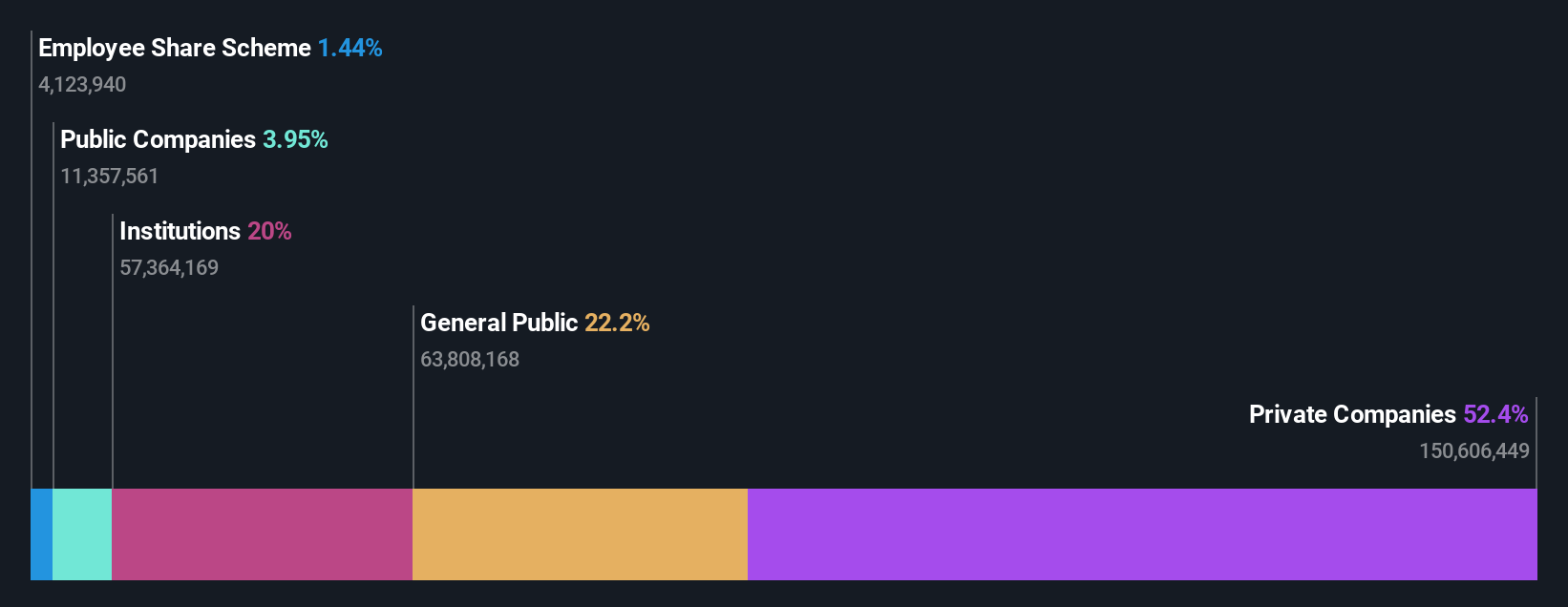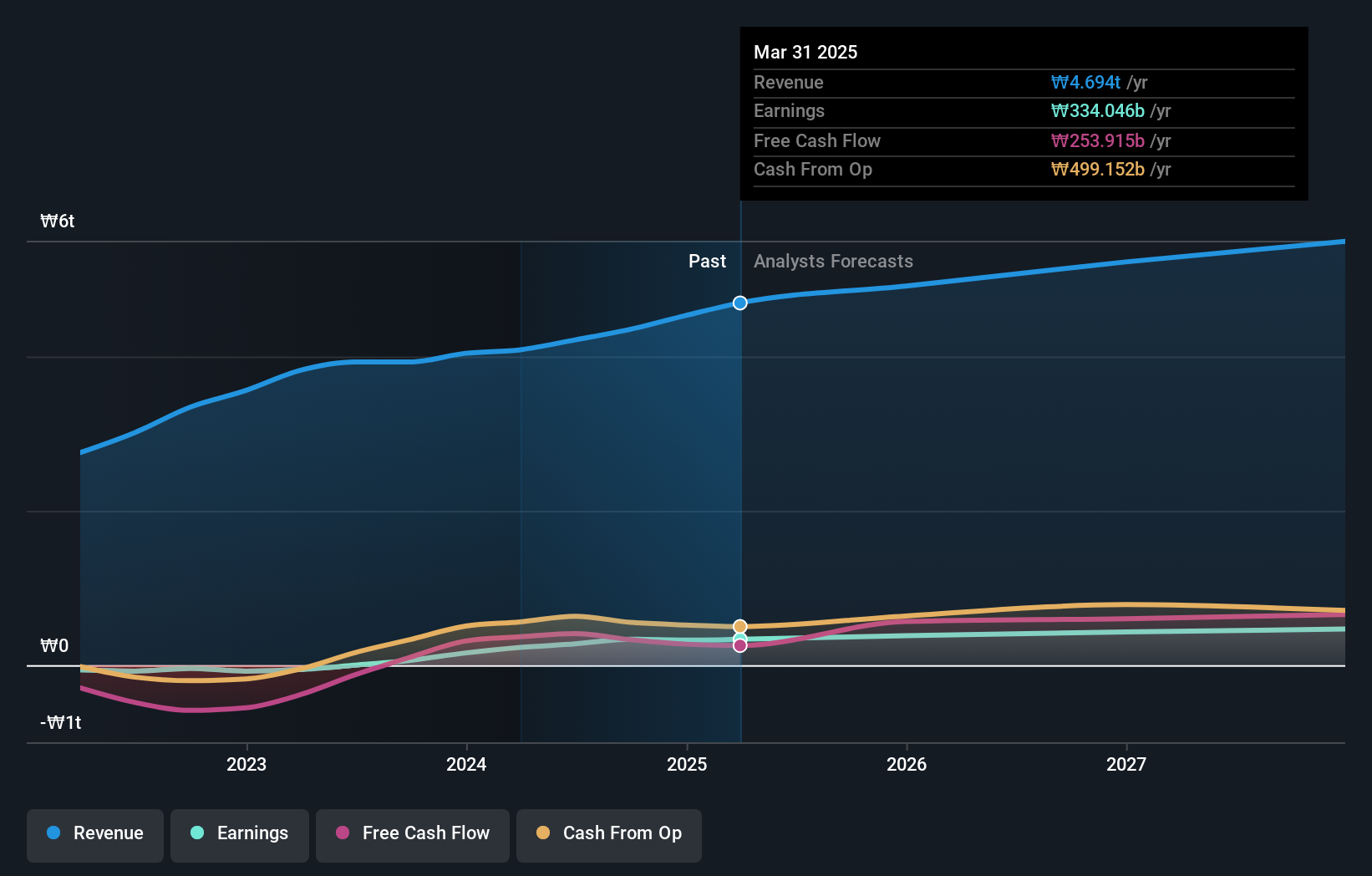- South Korea
- /
- Auto Components
- /
- KOSE:A073240
Private companies in Kumho Tire Co., Inc. (KRX:073240) are its biggest bettors, and their bets paid off as stock gained 9.3% last week
Key Insights
- Kumho Tire's significant private companies ownership suggests that the key decisions are influenced by shareholders from the larger public
- A total of 2 investors have a majority stake in the company with 52% ownership
- Institutions own 20% of Kumho Tire
To get a sense of who is truly in control of Kumho Tire Co., Inc. (KRX:073240), it is important to understand the ownership structure of the business. With 52% stake, private companies possess the maximum shares in the company. That is, the group stands to benefit the most if the stock rises (or lose the most if there is a downturn).
As a result, private companies collectively scored the highest last week as the company hit ₩1.4t market cap following a 9.3% gain in the stock.
Let's take a closer look to see what the different types of shareholders can tell us about Kumho Tire.
Check out our latest analysis for Kumho Tire

What Does The Institutional Ownership Tell Us About Kumho Tire?
Institutional investors commonly compare their own returns to the returns of a commonly followed index. So they generally do consider buying larger companies that are included in the relevant benchmark index.
As you can see, institutional investors have a fair amount of stake in Kumho Tire. This implies the analysts working for those institutions have looked at the stock and they like it. But just like anyone else, they could be wrong. When multiple institutions own a stock, there's always a risk that they are in a 'crowded trade'. When such a trade goes wrong, multiple parties may compete to sell stock fast. This risk is higher in a company without a history of growth. You can see Kumho Tire's historic earnings and revenue below, but keep in mind there's always more to the story.

Kumho Tire is not owned by hedge funds. Looking at our data, we can see that the largest shareholder is Xingwei Korea Company Limited with 45% of shares outstanding. The second and third largest shareholders are IBK Asset Management Co., Ltd. and The Korea Development Bank, with an equal amount of shares to their name at 7.4%.
After doing some more digging, we found that the top 2 shareholders collectively control more than half of the company's shares, implying that they have considerable power to influence the company's decisions.
While studying institutional ownership for a company can add value to your research, it is also a good practice to research analyst recommendations to get a deeper understand of a stock's expected performance. There are a reasonable number of analysts covering the stock, so it might be useful to find out their aggregate view on the future.
Insider Ownership Of Kumho Tire
The definition of an insider can differ slightly between different countries, but members of the board of directors always count. Company management run the business, but the CEO will answer to the board, even if he or she is a member of it.
Most consider insider ownership a positive because it can indicate the board is well aligned with other shareholders. However, on some occasions too much power is concentrated within this group.
Our data cannot confirm that board members are holding shares personally. Given we are not picking up on insider ownership, we may have missing data. Therefore, it would be interesting to assess the CEO compensation and tenure, here.
General Public Ownership
The general public-- including retail investors -- own 22% stake in the company, and hence can't easily be ignored. This size of ownership, while considerable, may not be enough to change company policy if the decision is not in sync with other large shareholders.
Private Company Ownership
It seems that Private Companies own 52%, of the Kumho Tire stock. Private companies may be related parties. Sometimes insiders have an interest in a public company through a holding in a private company, rather than in their own capacity as an individual. While it's hard to draw any broad stroke conclusions, it is worth noting as an area for further research.
Public Company Ownership
Public companies currently own 4.0% of Kumho Tire stock. This may be a strategic interest and the two companies may have related business interests. It could be that they have de-merged. This holding is probably worth investigating further.
Next Steps:
I find it very interesting to look at who exactly owns a company. But to truly gain insight, we need to consider other information, too. Consider for instance, the ever-present spectre of investment risk. We've identified 1 warning sign with Kumho Tire , and understanding them should be part of your investment process.
If you would prefer discover what analysts are predicting in terms of future growth, do not miss this free report on analyst forecasts.
NB: Figures in this article are calculated using data from the last twelve months, which refer to the 12-month period ending on the last date of the month the financial statement is dated. This may not be consistent with full year annual report figures.
Valuation is complex, but we're here to simplify it.
Discover if Kumho Tire might be undervalued or overvalued with our detailed analysis, featuring fair value estimates, potential risks, dividends, insider trades, and its financial condition.
Access Free AnalysisHave feedback on this article? Concerned about the content? Get in touch with us directly. Alternatively, email editorial-team (at) simplywallst.com.
This article by Simply Wall St is general in nature. We provide commentary based on historical data and analyst forecasts only using an unbiased methodology and our articles are not intended to be financial advice. It does not constitute a recommendation to buy or sell any stock, and does not take account of your objectives, or your financial situation. We aim to bring you long-term focused analysis driven by fundamental data. Note that our analysis may not factor in the latest price-sensitive company announcements or qualitative material. Simply Wall St has no position in any stocks mentioned.
About KOSE:A073240
Kumho Tire
Engages in the manufacture and sale of tires in South Korea, Europe, North America, Central and South America, Asia, and internationally.
Undervalued with excellent balance sheet.
Similar Companies
Market Insights
Community Narratives




